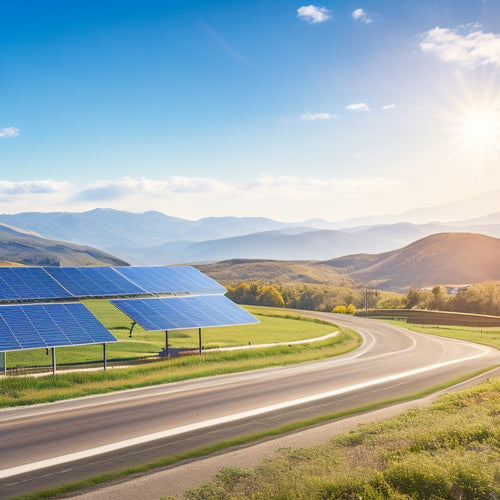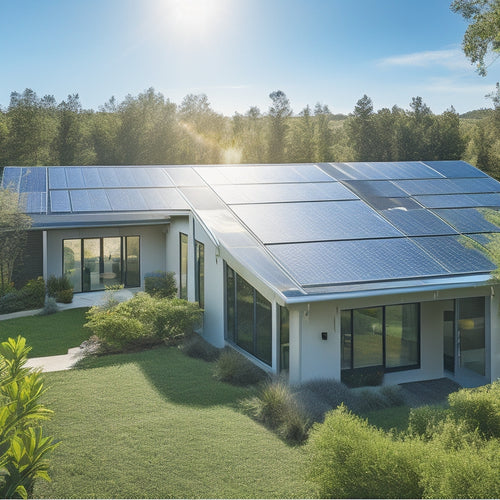
Cost of Putting Solar Panels on House
Share
You're contemplating installing solar panels on your house, and the first question on your mind is likely how much it will cost. The cost of solar panels varies, but on average, you can expect to pay between $15,000 and $30,000 for a typical residential solar panel system. However, you'll likely recoup some of this cost through lower energy bills and increased property value. In fact, solar panels can increase your home's value by up to 17%. Additionally, government incentives like the federal tax credit can help offset the upfront cost. As you weigh the costs and benefits, you'll want to evaluate factors like inverter technology, roof shading, and local installation requirements to maximize your savings.
The Essentials
- The cost of solar panels varies based on system size, quality, and installation company, with average costs ranging from $15,000 to $30,000.
- Federal and state incentives, such as the Solar Investment Tax Credit, can significantly reduce the upfront cost of solar panels.
- While the initial investment is high, solar panels can save homeowners between $400 and $1,000 per year on utility bills.
- The cost of solar panels is also affected by the quality of the equipment, with high-efficiency panels costing more than standard ones.
- Installation costs may be offset by long-term savings, and some states and utilities offer rebates or discounts for solar panel installations.
Save Money on Bills
You can greatly lower your energy expenses by switching to solar power, which directly translates to reduced utility bills.
By utilizing Renewable Energy solutions, you'll not only cut your electricity costs but also reduce your carbon footprint.
With solar panels, you'll generate free energy during the day, reducing your reliance on the grid and cutting your electricity costs.
As a result, you'll see a notable decrease in your monthly utility bills, putting more money back in your pocket.
Lower Energy Expenses
Roughly 70% of a typical household's energy expenditure goes towards heating, cooling, and powering appliances, lighting, and electronics. By installing solar panels, you'll greatly reduce your reliance on the grid and lower your energy expenses. This means you'll save money on your bills and enjoy greater energy independence.
With a Renewable Energy System, you can utilize the power of the sun to generate free energy and reduce your consumption of fossil fuels. As you investigate Off Grid Power(https://www.illchanterxlater.com) solutions, you'll uncover the benefits of energy self-sufficiency and a reduced carbon footprint.
You'll generate free energy from the sun, reducing your consumption of fossil fuels and your carbon footprint. This not only saves you money but also contributes to environmental benefits. You'll be producing clean energy, reducing greenhouse gas emissions, and playing a role in mitigating climate change.
As you generate your own energy, you'll be less dependent on utility companies and their fluctuating rates. This independence gives you more control over your energy expenses, allowing you to budget more effectively and make informed decisions about your energy usage.
Cut Utility Bills
Solar-powered homes enjoy significant savings on utility bills, translating to more money in your pocket. By utilizing solar energy, you'll reduce your reliance on the grid and lower your energy expenses. This means you'll have more freedom to allocate your finances as you see fit.
With residential solar, you'll be investing in a long-term solution that provides electricity independence and minimizes your environmental impact. By embracing a cleaner, more sustainable future Renewable Energy Solutions, you'll be taking a significant step towards reducing your carbon footprint.
The installation costs of solar panels may seem steep upfront, but the savings will add up over time. With minimal maintenance requirements and various financing options available, going solar is a smart move.
You can choose to connect to the grid, allowing you to sell excess energy back to the utility company, or opt for energy storage solutions to guarantee a steady supply during periods of low sunlight. By cutting your utility bills, you'll be taking a significant step towards energy independence and reaping the financial benefits that come with it.
Increases Property Value Fast
You'll be pleased to know that installing solar panels can greatly enhance your property's value, resulting in a higher selling price when you decide to put it on the market.
In fact, with top residential solar roofing solutions from companies like Tesla and Sunrun, studies have shown that solar-equipped homes sell for up to 17% more than similar non-solar homes.
Additionally, you can expect a faster sales cycle, as eco-conscious buyers are often willing to act quickly to secure a property with a renewable energy system.
Higher Selling Price
By installing solar panels, homeowners can significantly enhance their property's selling price, thanks to the increased appeal to environmentally conscious and cost-aware buyers. This is because solar panels offer a tangible benefit to potential buyers, providing a clear advantage over comparable properties without solar panels.
As a result, you can expect to see a substantial increase in your property's value, which translates to a higher selling price.
In fact, studies have shown that solar panels can increase your home's value by up to 17%, which is a substantial improvement to your home equity. This means that if you're planning to sell your property in the future, you can expect to reap the financial benefits of your solar panel investment.
Additionally, the solar panel benefits extend beyond just monetary gains, as they also contribute to a cleaner environment and reduced carbon footprint. By installing solar panels, you're not only increasing your property's value but also doing your part for the planet.
Faster Sales Cycle
Installing solar panels can also accelerate the sales cycle of your property, allowing you to capitalize on the increased worth sooner rather than later. This is especially important in today's solar market trends, where buyers are increasingly motivated by energy efficiency and eco-friendliness.
By installing solar panels, you can attract more potential buyers and create a sense of urgency around your property.
Studies have shown that homes with solar panels sell faster than those without, often within a few weeks or even days of listing. This is because solar panels are seen as a significant asset, providing a clear return on investment for the buyer.
Additionally, solar panels can appeal to a wider range of buyers, including those who prioritize environmental sustainability and energy independence.
High-Efficiency Inverter Technology
When you're evaluating high-efficiency inverter technology, you'll want to examine two key factors: inverter conversion efficiency and maximum power point tracking (MPPT).
To maximize renewable energy storage and reduce reliance on the grid, it's crucial to pair your inverter with a high-performance solar battery system.
Inverter conversion efficiency measures how effectively the inverter converts DC power from your solar panels to AC power for your home or business.
Inverter Conversion Efficiency
Utilizing the full potential of your solar panel system relies heavily on the efficiency of your inverter, as it converts the DC power generated by your panels into usable AC power for your home or business.
Inverter conversion efficiency is critical, as it directly affects the amount of energy you can utilize from the sun. You'll want to reflect on the type of inverter you install, as different types have varying levels of efficiency.
There are three main inverter types: string inverters, microinverters, and power optimizers. String inverters are the most common, but they can be less efficient due to potential mismatched panel performance.
Microinverters, on the other hand, are more efficient, as they convert DC power at the individual panel level. Power optimizers offer a compromise between the two, providing some of the benefits of microinverters at a lower cost.
When comparing inverter efficiency, look for the maximum power point tracking (MPPT) efficiency, which should be above 95%. A higher efficiency rating means more of the sun's energy is converted into usable power, reducing your energy bills and carbon footprint.
Maximum Power Point
Maximum Power Point (High-Efficiency Inverter Technology)
You're probably wondering how to maximize your solar energy production. The answer lies in the Maximum Power Point (MPP) technology, a high-efficiency inverter feature that enhances your solar panel's performance.
MPP tracking systems continuously monitor your solar output and adjust the panel orientation to capture the ideal angle, ensuring maximum power generation.
By utilizing MPP, you can increase your solar efficiency by up to 20%. This is achieved through advanced performance monitoring, which analyzes your system's sizing, load analysis, and energy production in real-time.
The inverter then adjusts the panel's angle to match the best position, resulting in higher energy production.
With MPP, you can enjoy greater freedom from reliance on the grid and lower your energy bills. By tapping into the full potential of your solar panels, you'll be able to generate more power and reduce your carbon footprint.
Assess Your Roof's Shading
You'll need to identify potential shade sources on your roof, including trees, chimneys, vents, and skylights, as these can greatly influence solar panel performance.
To maximize energy production, it's crucial to evaluate the significance of photovoltaic cells in your solar panel system and the effect of shading on their efficiency.
Next, you'll want to conduct a roof obstruction analysis to determine how these shade sources will affect the amount of sunlight your solar panels will receive.
Shade Sources Identified
Your roof's shading plays an important role in determining the effectiveness of your solar panel system. To conduct a thorough shading analysis, you'll need to identify the sources of shade on your roof.
Start by observing your roof's surroundings, taking note of any obstructions that could cast shade on your solar panels. Common shade sources include trees, neighboring buildings, and roof features like vents, skylights, and chimneys.
You may also want to take into account the time of day and year, as the sun's position changes throughout the day and seasons. For instance, a tree that casts shade in the summer may not do so in the winter.
Understanding the shading impact on your solar panel system is vital in determining its overall performance. Even partial shading can greatly reduce energy production.
Roof Obstruction Analysis
With your shade sources identified, it's time to conduct a detailed roof obstruction analysis to assess your roof's shading. This analysis will help you determine the best panel placement for ideal energy production.
Consider your roof's pitch, as steeper roofs may require specialized installation equipment, increasing costs. You'll also need to assess the solar orientation of your roof, guaranteeing your panels are installed at the best angle for energy production.
A detailed shading analysis will identify areas of your roof that receive partial or full shade, helping you avoid installation challenges. Your roof's structural integrity is also essential, as older roofs may require additional support to handle the weight of solar panels.
Maintenance considerations, such as leaf debris and snow removal, should also be factored into your analysis. Weather impact, including high winds and hail, must be considered to confirm your solar panels can withstand harsh conditions.
Government Incentives Boost Savings
You'll be pleased to know that the cost of solar panels can be appreciably reduced thanks to government incentives.
The Federal Tax Credit, for instance, allows you to claim a percentage of the total cost of your solar panel system as a credit on your federal income taxes.
Federal Tax Credit
The solar investment tax credit (ITC) is a lucrative federal incentive that enhances your solar panel savings. As a homeowner, you're eligible for this credit if you've installed a solar panel system on your primary or secondary residence.
The ITC allows you to claim a tax credit of 26% of the total cost of your solar panel installation, including the installation process, equipment, and labor.
To qualify for the ITC, you must meet certain tax eligibility criteria. You must have a tax liability to claim the credit, and the system must be installed and operational during the tax year.
Additionally, the credit can be carried over for up to five years if you're unable to claim the full amount in the first year.
The ITC is a significant incentive that can help offset the upfront cost of solar panels. By claiming this credit, you can reduce your tax liability and enjoy greater savings on your solar investment.
Be certain to consult with a tax professional to verify you meet all the necessary requirements and can claim the credit successfully.
Frequently Asked Questions
Can I Install Solar Panels on a Rented Property?
You'll need to review your tenant agreements and obtain installation permissions from your landlord before installing solar panels on a rented property, ensuring you're not violating any terms or lease restrictions.
Do Solar Panels Void My Roof's Warranty?
When you install solar panels, you're wise to evaluate roof warranty implications. You'll want to confirm the installation won't void your roof's warranty, so review the fine print and consult with your roofing contractor to determine the best solar panel installation considerations for your specific situation.
Can I Sell Excess Energy Back to the Grid?
You can sell excess energy back to the grid through net metering options, which allow you to generate credits on your utility bill, or participate in energy buyback programs, giving you financial freedom and a sense of independence.
How Long Does It Take to Install Solar Panels?
As you commence on this liberating expedition, you're probably wondering how long it takes to utilize the sun's power. Typically, the installation process unfolds like a well-oiled machine, taking around 3-5 days for a standard residential installation timeline.
Will Solar Panels Increase My Property Taxes?
When you install solar panels, you're wondering if they'll increase your property taxes. Fortunately, in many states, solar panel assessments are exempt from property tax implications, so you won't see a hike in your tax bill.
Final Thoughts
You're finally considering putting solar panels on your house, and it's about time! Despite the initial investment, you'll be saving money on bills in the long run. In fact, your property value will increase faster than you can say "solar panels". With high-efficiency inverter technology, you'll be generating clean energy in no time. Just remember to assess your roof's shading first, and don't forget to cash in on those government incentives. It's ironic that going green can save you so much green - but who's complaining?
Related Posts
-

Solar Phone Chargers for Camping Essentials
Solar phone chargers are must-haves for your camping essentials, allowing you to stay connected while enjoying nature...
-

Is Switching to Green Energy Solutions Easy
Switching to green energy solutions isn't just easy; it's also beneficial. You can greatly cut utility costs and enjo...
-

Installing Metal Solar Roofs for Maximum Energy Efficiency
Installing metal solar roofs can drastically enhance your home's energy efficiency and durability. These roofs withst...


